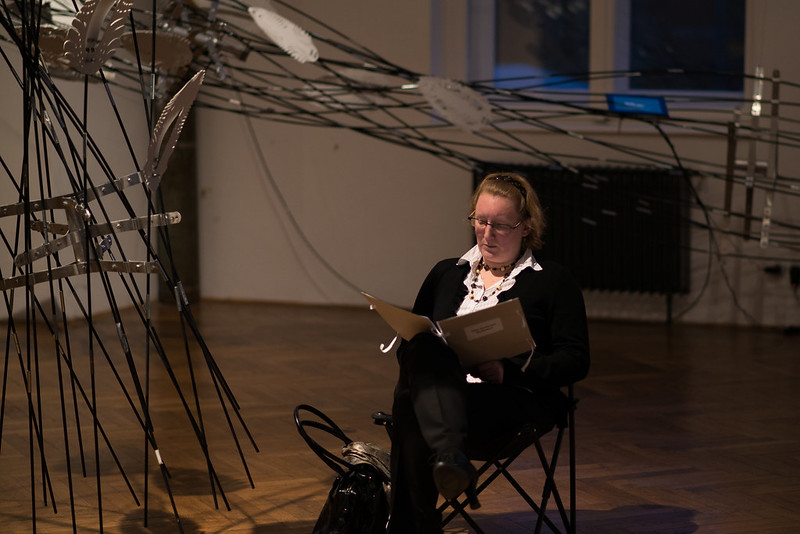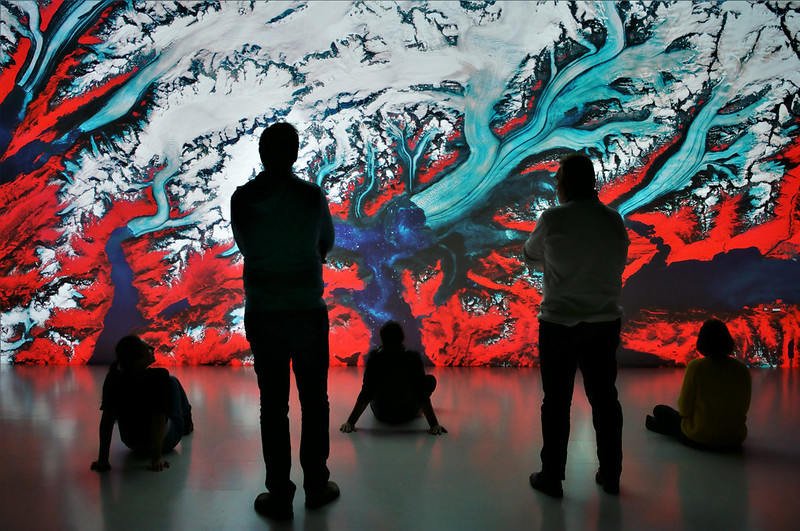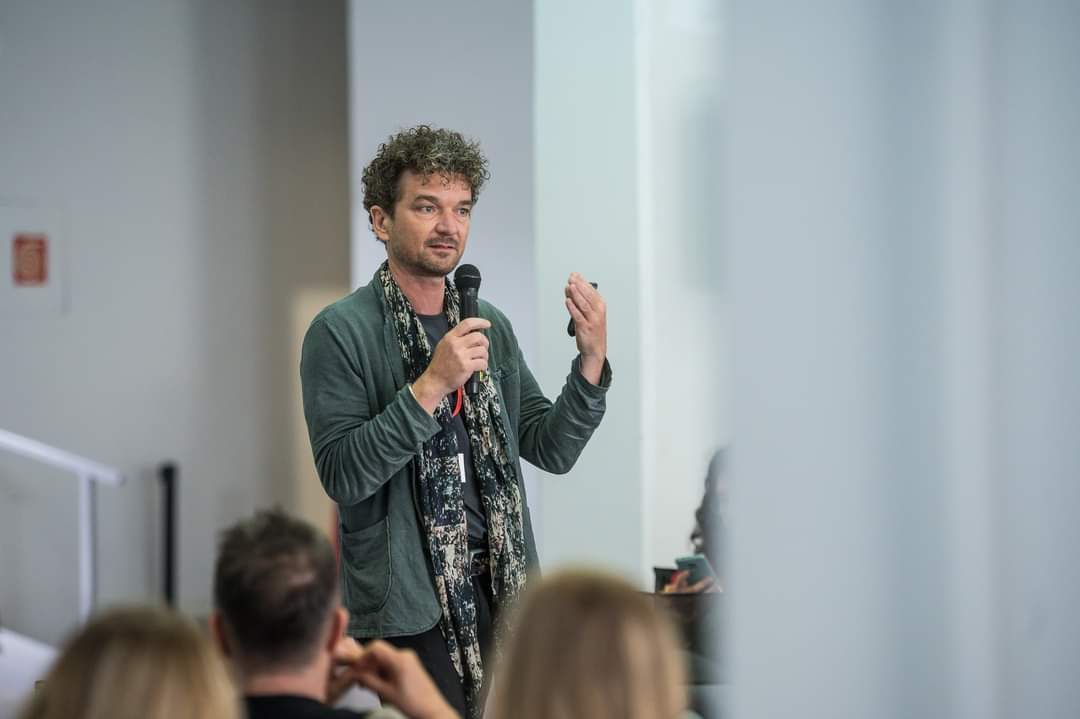“Artistic processes are so valuable because they are free” says Lars Ebert, Secretary General of Culture Action Europe, in an interview with Creatives Unite and he notes a lack of trust among policymakers and citizens regarding the cultural sector's potential in society. “We are constantly required to justify our existence,” observes the Secretary General of CAE, emphasising the importance of trusting institutions and artists to produce relevant work without having to argue for it.
Lars Ebert, argues that culture needs a strong policy and an ambitious framework that ensures fair working conditions and autonomy to the sector. He also advocates the launch of a discussion on the notion of a contemporary European culture. The Secretary General of the CAE is defending the continuation of a stand-alone Creative Europe programme with increased funding, and is pointing out that funding decisions in the EU are political rather than rational.
AI and the exploitation of creative content, the precarious working conditions of artists and cultural workers, freedom of artistic expression, sustainability, and self-instrumentalisation are some of the key challenges facing the cultural and creative sectors according to CAE’s Secretary General.
Lars Ebert discusses artistic research within the context of European competitiveness, emphasising the importance of recognising that art-based methods generate new knowledge. Finally, with regard to the war in Ukraine and the EU's new defence strategy, the Secretary General of CAE asserts that culture has a role to play, stressing that security comprises many layers and components. "Culture keeps a society together," concludes Lars Ebert.
Creatives Unite (C.U.): The European Commission has launched a new initiative to shape the new framework for cultural and creative sectors under the name Culture Compass. Do you agree that culture needs a compass?
Lars Ebert (L.E.): I think culture needs a strong policy.
Compass is just a fashionable term that Ursula Von der Leyen loves to use. If we took it to literal, it would suggest that we lost our way. But the reality is for sure that we constantly need to explain where we are going, what our output will be and how we measure it with impact indicators. Especially when it comes to culture I like to quote Antonio Machato: "Traveler, there is no path, the path is made by walking".
Artistic processes are so valuable because they are free. We in the sector are used to "trust the process". But it's precisely this trust that is lacking in public opinion and certainly in the funding programmes that are the result of cultural policy. Instead of playing to a very calculated Excel sheet-based agenda we need a framework that allows us to be autonomous and free. I will then have my peace with the term Compass!
C.U: What characteristics do you suggest that this framework should have?
L.E.: It needs to set the tone for all the other documents that will define our work in the next years. It needs to be ambitious and use all the leverage that it has within the competences of the European Commission.
We're used to hearing that the EUs competences in the area of culture are limited and that the EU can only focus on transcultural mobility, transnational cultural production and cultural capitals. I think that, within these constraints, now is the moment to be very bold and to start talking about European contemporary culture. There is something that is distinctly European.
Generations of Creative Europe projects have produced knowledge and content that is transnational. There are criterias that describe what makes a European cultural process and a European cultural outcome. I think we should start supporting that by talking about the notion of a contemporary European culture.
"The precariousness in our sector is overwhelming. We need to address this"
C.U.: What are the most significant challenges currently facing the cultural and creative sectors?
L.E.: Artificial intelligence is a high-priority issue. Despite the Artificial Intelligence Act, we are not even close to properly protecting creators or their content from exploitation.
Sustainability is another important issue. We must consider how we can contribute to changing the narrative of making our societies more sustainable, and how we can help societies to change, beyond just becoming greener ourselves as a sector. The issue of working conditions is also extremely urgent. The precariousness in our sector is overwhelming. We need to address this.
Another big question is why we focus so much on the past and hardly discuss culture's contribution to the future. This is about the creative power of contemporary culture and socially engaged arts, and the aspect of cultural democracy that brings our societies forward. I, as a citizen, only have a reason to vote or be voted for, and exercise democratic agency, if I am involved in creating images of a better future. This is a very political issue.
Freedom of artistic expression and institutional autonomy are also critical issues. Freedom of artistic expression is under threat throughout Europe. This is evident in many countries and takes various direct and indirect forms. Examples range from dismissing people from official positions to imposing conditions on funding programmes and even leading artists and organisations to practise self-censorship to secure funding.
C.U.: You also brought up the issue of trust earlier.
L.E.: Yes, and this is related to the sector's own instrumentalisation. What I mean is that politicians and policymakers — and perhaps even citizens — do not recognise the potential or role of the cultural sector in our societies in the same way that we do. Consequently, there is a great deal of distrust towards us. By distrust, I mean that we need to prove our value in terms that are not our own. So, we are accustomed to explaining that citizens who visit museums are less likely to suffer from depression and that neighbourhoods that engage in cultural activities have stronger social cohesion.
As artists and organisations, we are constantly required to justify our existence. Over the years, in the neoliberal heyday, this has led us to play to an entrepreneurial agenda. We have played to all kinds of agendas, such as jobs and growth or social cohesion. However, if we truly look inwards and have internal conversations, it will become clear that most of us woudl agree that, while not denying the impact we have on other policy areas, our existence has value as such. When I talk about trust, I'm talking about trusting culture as a foundation of society, without further argument.

C.U.: What do you think the strategic direction of the new EU policy framework should be?
L.E.: I think the main dimensions of security, democracy and competitiveness need to be taken into account. When it comes to competitiveness, we should for instance discuss artistic research. I think it is crucial that we recognise the fact that art-based methods generate new knowledge. Artists express knowledge through an artistic language, pushing the boundaries of their disciplines like other scientists and scholars. If we recognise art as a language of knowledge and a knowledge domain, we allow artists to work on the same level as neuroscientists, taking their language seriously. That again goes back to the trust issue.
When it comes to democracy, the freedom of artistic expression and autonomy are very important issues. So is the ability to reimagine the future, which is necessary for democratic agency, as well as the recognition of the necessity to advance cultural democracy. We must ensure that every European citizen has the right to engage in cultural activities and contribute to our cultural institutions. We can only fully belong to a society and overcome the fragmentation that is one of the main problems at the moment by recognising ourselves in the cultural fabric around us.
And finally, when it comes to security... the whole security conversation is difficult to lead without slipping into war rhetoric. But when you talk to Ukrainians, and not just Ukrainians, it's very clear what role culture plays. It keeps a society together on the inside. It ensures that you survive psychologically, that you stand together, that you work through traumas and maintain hope. But it also provides a practical solution: a museum where you can go if your house is destroyed, and where you can meet other people and reorganise. This is obvious in Ukraine, but other countries also demonstrate how culture can be valued in terms of security and defence. For example, Finland has incorporated culture into its defence strategy.
C.U.: I was wondering whether, by trying to integrate culture into another major agenda arising from political developments, we are instrumentalising it again.
L.E.: When I speak about instrumentalisation or self-instrumentalisation or rather hyper-instrumentalisation, I am not opposing the fact that culture contributes to addressing burning problems of humanity. The question is how culture deals with them. I think instrumentalisation becomes a problem whenever the freedom of artistic expression and the autonomy of cultural institutions are limited by clear ideas of how they should function or solve a problem. This brings us back to the issue of trust.
If trust in the cultural sector is strong enough, and if we invest in culture because we know it will address issues appropriately, then we are not instrumentalising it. We simply allow the artists to do their work.
C.U.: Are you worried that because of the Rearm Europe plan we might see budget cuts to culture across Europe?
L.E.: Of course I worry. That's the emotional power of the Rearm Europe: who defends lives deserves money. I think if that is the sentiment we need to take that sentiment serious because we are of course feeling under threat. But we have to make sure that we keep telling our story not only to politicians but also to our fellow citizens that security is made up of many layers and many components.
And that catching the missiles in the air before they hit is is crucial but that we lose a lot of our security, if we lose the cultural aspects that keeps our communities together, that keeps us mentally healthy. It's not just about physical survival. We need to make it clear that without culture, we will lose our humanity.

C.U.: You mentioned the Creative Europe programme earlier. Do you think it has been an effective programme?
L.E.: Yes, definitely. The Creative Europe programme has set out innovative ways of working together. Over time, that have cascaded down to national policies. In that sense, I think it is very effective. However its reach is limited in terms of money. And of course, there are many aspects of the programme that we need to reconsider. For instance, the fact that we need to provide co-funding of 20%, 30% or 40%. This obligation is not present in other programmes, such as Horizon or Erasmus. It forces small players out because they can't afford the co-funding. These are often the ones doing the most groundbreaking work.
At the same time, we can see that certain programme conditionalities are having an innovative effect across the sector, in areas such as green practices, gender equality and equity. Now there's even talk of including a conditionality on fair pay. But we can only include these conditionalities, which I think are very valid , if the funding as such is high enough.
"We definitely need a stand-alone Creative Europe programme with more money"
C.U.: Do you support the continuation of the programme?
L.E.: Absolutely, I demand it! We know that there's a big threat that it is merged with other programmes. But culture cannot only contribute to other policy agendas and be mainstreamed into other areas. We need to be supported ourselves first, before we can contribute to other agendas. So we definitely need a stand-alone Creative Europe programme with more money.

C.U.: Through its recent Cultural Deal for Europe campaign CAE, in partnership with the European Cultural Foundation and Europa Nostra, called for 2% of the EU budget to be allocated to culture. How did you arrive at this figure?
L.E.: For every euro invested in the cultural sector from public funds, €11 of GDP is generated. Currently, culture receives only 0.2% of the EU budget. Agriculture, by contrast, receives 19% of the EU budget and generates a 1% return on investment. These figures show that the argument is political, not rational. You might say it's ambitious, but I would say, in the light of the numbers, and compared with other areas, we are modest.
C.U.: Culture Action Europe recently launched the Ask, Pay, Trust campaign. What are the specific requests behind these three verbs?
L.E.: We believe that in all the processes we set up, in all the actions we take to make our societies in Europe more future-proof, we have to ask an artist to sit at the table with us and to participate in re-imagining the world. After we've asked the artist, we pay them properly. And then we trust their process. We don't ask them to explain to us beforehand what they're going to do and where it's going to end. We are comfortable with the situation. It's the unpredictability that is the greatest quality of art.
So in this Ask, Pay, Trust campaign we are looking on the role of the artist and how we should relate to artists. Those three verbs are the essence of what we need to focus on. And then everything else will come.
--
Photo credit 1: Friends of Europe
Photo credit 2 : artistic bokeh
Photo source
Photo credit 3: Ars Electronica
Photo source
Photo credit 4: Culture Action Europe











